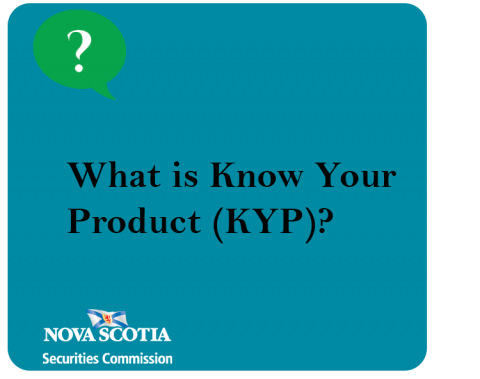Submitted by nsscadmin on

Last week on Throw Back Thursday we reshared our old blog post on Know Your Client (KYC) suitability obligations for advisers. In the post it briefly mentions Know Your Product (KYP) obligations. That led to one of our readers wanting to know more about KYP.
Before we talk about KYP directly let’s start with suitability. Informed and appropriate investing recommendations from an adviser are dependent on suitability. Not all investments and investing methods are suitability for everyone. There’s no one-fits-all type of investing as everyone has different investment goals, time horizons, risk tolerance and financial circumstances. As we explained in our previous blog post detailed KYC will help an adviser recommend suitable investments.
However, KYC is just one half of the equation. The other half is KYP. The full details of KYP are outlined in CSA Notice 33-315. Under KYP an adviser “must understand the structure and features of each investment product they recommend.” For example, what’s the point of knowing a client’s risk tolerance if you don’t know the risk factor of an investment. Both must matchup to be suitable investments.
Under KYP obligations an adviser must know the following about any investment product they recommend to a client:
General features and structure
This includes the basis of the securities returns (minimum return, dividends, interest rate), use of leverage, any conflicts of interest and overall complexity, transparency, and uniqueness of features of the products structure.
Risks
The possibility that a client may lose some or all of their investment. All risks related to the product must be known, such as price volatility, liquidity risk and exposure to counterparty risk.
Cost
What are the investments fees? Including fees paid to registrants, commissions, sales charges, trailer fees, management fees and any embedded costs. There may also be other fees not included in this list which also must be known.
Parties Involved
What is the issuers current financial position and their financial history? The qualifications, reputation and track record of the parties involved in the product, including but not limited to the fund manager, portfolio manager, and guarantors.
Legal and Regulatory Framework
Do any laws or rules from self-regulatory organizations apply to the registrant? Are the registrant’s disclosures complete and up-to-date?
KYP obligations apply to all investment products. An adviser must thoroughly and accurately know all required information about a product to ensure any recommendations they make toward that product are suitable. If your adviser cannot thoroughly and plainly explain why they are recommending an investment product for you, it may not be the most suitable product for you. Always make sure your investment choices are suitable by keeping your KYC updated and asking any KYP questions you need to be comfortable in your investment decisions.
